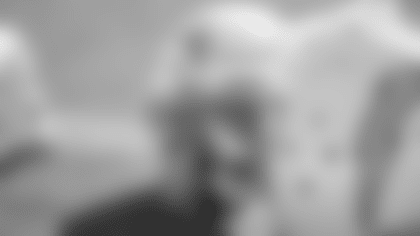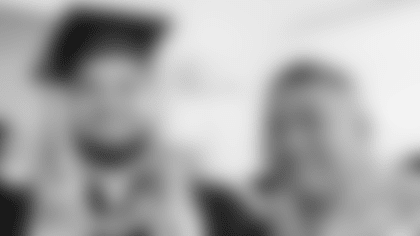Last year, President of Football Operations John Spanos and General Manager Tom Telesco allowed a peek behind the veil for the very first time at the Chargers' Combine interview with a top WR prospect.
These meetings have always been shrouded in secrecy.
Now, the Chargers are inviting you in for not one, but two, back-to-back interviews for what amounts to 15 of the most important minutes of a prospect's life to date.
For some, it's make or break.
"For me, it's pass-fail," Telesco bluntly explains. "Does he have it or not have it? If he doesn't have it, can it be developed? If not, that says a lot."
"Every prospect is different," Spanos added. "And depending on their background and what questions we may have going into the interview, how they answer those questions is going to go a long way for what our overall final grade is for that prospect."
The players' interviews you are about to witness are two of the top linebacker prospects available in the draft.
Both come from major programs and are fresh off standout careers.
However, the Chargers have different priorities when it comes to interviewing each linebacker.
So, do these two prospects have what it takes to be the next Charger?
Are they worth investing what will likely be a Day 1 or Day 2 pick to add to the Bolts?
Join the team's top decision makers in finding out for yourself.
Along the way, you'll hear running commentary from those in the room to help make your decision.
This is a crucial piece to the draft puzzle, and a peek behind the veil not many are afforded.
So sit back, relax, and take a coveted seat inside the Chargers' interview room.
It's 10:30pm on Thursday, March 1.
Only two more interviews remain in what has been a long, grueling day for the Chargers.
It began at Lucas Oil Stadium at 6:00am, and over 16 hours later, the team is finally winding down.
But not before the last two linebackers take their place on the hot seat.
The door opens up to room 129 and in walks one of the top LB prospects in this year's draft.
We'll call him Prospect 1.
He walks into the room, introducing himself with a firm handshake while looking each person dead in the eye.
He takes his seat two feet in front of Director of College Scouting Kevin Kelly, who plays a key part in these interviews. Kelly's tasked with finding out background information on the prospect, making sure the information aligns with what they have already uncovered.
What Kelly is asked to do isn't easy.
It's his job to ask the tough, but important, questions teams need to know. After all, the Chargers invest heavily in these prospects, and they must know what they are getting.
Fortunately, this is one of Kelly's strengths as he's honed his craft over the years.
Director of College Scouting Kevin Kelly: "I have empathy for the player walking into our room and seeing 10 to 15 people, like ownership of the team, the coach, the GM. He's in the hot seat in front of me and I'm pushing personal issues. When he sits down, I try to make him feel comfortable. I want him to know we only get 60 of these, so we obviously like him a lot. He's one of our 60, so welcome to the Chargers. I try to give some positivity on how impressive their career was in college so they don't think it's just like an indictment. Because if the kid's comfortable, then they can talk."
Head Coach Anthony Lynn: "Kevin does an outstanding job because he knows certain buttons to push on certain players and what not to push. He does an outstanding job getting the personal information out on a young man and asking the right questions. When you ask the right questions, sometimes you get really powerful answers."
That's the case with Prospect 1.
Kelly begins his session with a simple statement.
"You were very exciting to watch on film."
Then begins asking questions at a rapid-fire pace.
"What went into your decisions out of high school to play at your school?"
"Did you have any injuries in college?"
"How much experience do you have on special teams?"
"Are there any incidents from your past we should know about?"
The questions go on and on, aimed to get at the heart of who Prospect 1 is as a person and a player.
So, what is the number one thing members of the Bolts' brain trust are looking for?
Head Coach Anthony Lynn: "I'm really looking for intangibles. I think guys can learn. Like I said, sometimes that environment is tough. They come in. They don't know you, they don't know your system. You install something and they've got to install it back. I'm looking for intangibles; guys who want to compete. You can tell by certain answers. If there's a selfish guy or a team guy, sometimes you are what you are and that stuff shows up."
General Manager Tom Telesco: "For me, it's trying to gauge their football intelligence. If you're trying to figure out their personality in that amount of time, it's very hard to do. But, you can get a really good feel for their football intelligence, what they know, what they ran at their school by using film, using board work. Even in the short period of time, you get a good feel."
Director of College Scouting Kevin Kelly: "I'm always amazed at their life stories, and many of them overcoming pretty substantial adversity in things. I'm just trying to sort through that, and it's most importantly about the young man right in front of you at that moment. Not so much when he was 17 and maybe made a mistake. I want to know about him right now."
President of Football Operations John Spanos: "I just want to hear what he has to say. There's a million different ways he can answer those questions, and I think that there's no one right way. There are for sure some wrong ways, but there's more than just one right way to answer. I think first and foremost is honesty. You're never going to 100-percent be able to tell how genuine someone's being, but you can get a feel. You can get a feel every day in life when you talk to people how genuine someone's being. I think there's an aspect of it where we look at it and ask ourselves if he's being genuine."
Every eye is trained on the prospect, but at the same time, if you listen closely, you can hear the sound of a dozen pens frantically scribbling into notepads.
With 60 interviews to conduct, it's easy for each 15-minute session to blur into the next.
Thus, jotting down exactly what comes to their minds is imperative.
What's fascinating is how different each person's process is, and what they value out of the interviews.
Director of College Scouting Kevin Kelly: "I'm focused on the impression the guy is making on me. His presence. What I think of his maturity level. You know, this is the first time I've talked to him. So just my general impressions about how he'd fit in our building, our locker room and our community."
General Manager Tom Telesco: "I'm writing down whatever is in my head. Since those interviews are back-to-back-to-back the whole night, I'll write things down because I know I'm not going to remember the 8:00pm interview next to the 10:15pm interview weeks later. I write everything down, and when we get back to the office, I'll go back through my notes and type those all in."
Defensive Coordinator Gus Bradley: "I jot down points that were brought up in the meeting that may have struck me or (ones) I have to look into more. As they're talking, it brings up more questions that you may want to ask and it might not be at that specific interview. It might be at the train station or if they ever come into the building. (I'd say,) 'Hey, remember at the Combine, you stated this? I just want to follow up and ask you a couple questions.' It's more just when they come into the building."
Director of Player Personnel JoJo Wooden: "I want to write down everything that's happening because when I do get back into the office and start going through the tape, I can say, 'Okay, let's just look at what happened in our meeting when he was up on our board.' It helps give (context) to what I'm watching."
Kelly's almost finished with Prospect 1.
But first, there's one more question he has before turning it over to Chargers' linebackers coach, Richard Smith.
And it may be the most important of his six-minute session with the linebacker.
"What are your goals in the NFL?"
The response is music to the Chargers' ears.
"To help my team win a Super Bowl."
Head Coach Anthony Lynn: "A lot of guys answer, 'I want to be the best' or 'I want to go to a Pro Bowl.' If a Super Bowl is your fourth 'I' then you question it. It doesn't mean you don't take the guy, but it just means that you know what you're getting. You want to bring guys who say their priorities are to win the Super Bowl more than the others into our environmental culture where they can develop."
Defensive Coordinator Gus Bradley: "That's what you want to hear. Because really, you want to have that ability where you can challenge a player (to accomplish that goal of winning a Super Bowl). We really want an environment where it's a really challenging environment where you feel like as a coach, you can challenge a player and they accept. I think the biggest part is, will they welcome challenge? Will they want hard coaching? Do they want to be the best that they can be?"
Director of College Scouting Kevin Kelly: "We've been working on this for the entire season. When you visit a school, you're essentially a private investigator. You talk to everybody about the player, but you don't talk to the player. It's about his version of all this information you've gathered from all these sources to put the puzzle together. I always say, scouting a player is relatively easy. Scouting a person, that's very challenging. I think in any profession, it's how bad you want something. You can't really measure that."
Now it's Richard Smith's turn.
The Chargers' linebackers coach is an invaluable resource, boasting 31 years of NFL experience that includes multiple stints as a defensive coordinator and assistant head coach.
Smith stands behind a projector with multiple cutups of plays from Prospect 1's career. He spent the previous weeks looking at countless plays from every linebacker prospect's career, making notes on which ones he wanted to find out more information about.
Linebackers Coach Richard Smith: "Before we go into the interview, I read up about their entire backgrounds. So if there's anything we need to address in there, we make sure we address it so we're able to find out any issues or any situation. We're also able to evaluate film before we get in there. So before we sit down, I can understand the kid's strengths and weaknesses so when we ask him questions, we can see how he'll handle those questions. And then also, being able to evaluate some film with him to see how well he can talk back his defense with you."
Prospect 1 turns his chair around and sits next to Kelly as the first play is shown on the screen.
It's a back-breaking deep touchdown pass from one of the prospect's most important games, leading to a brutal loss.
Smith wants to know what went wrong.
"A lot of things went wrong."
Prospect then goes into vivid detail on every breakdown and mistake all 11 players made.
Not just the linebackers.
Everyone.
This play happened months ago, yet he describes it in a way in which you'd think he'd just come to the sideline to discuss what happened with one of his coaches.
What Prospect 1 says about each play is one of the most important parts of the interview as it provides context to what the Chargers have already watched on tape.
After all, when watching film, coaches and evaluators don't know whether the prospect was staying true to his assignment or if it was his fault for the blown coverage.
The additional information is crucial.
President of Football Operations John Spanos: "The coaches do a great job of pulling out plays that they have specific questions on. I think number one, it depends on the coach and what play he wants to pull. Some guys like to pull plays that maybe show an area of a player's game where they have a question. Then others pull ones where they want to ask (a certain question) on what the player was thinking. So that part of it is really helpful."
General Manager Tom Telesco: "If what we see and hear doesn't line up with what we've done in the fall, then we have to go back and do some more work to figure out where the disconnect was. So that part is very important."
The next play is one in which Prospect 1 adjusts the call and re-aligns his teammates just prior to the snap.
"What did you see here? Why did you do that?"
Prospect 1 then goes into vivid detail about his film study that tipped off exactly what was coming next.
Sure enough, his teammates were in position the make a tackle for loss.
The next play regards his coverage job, when a player got behind him for a big gain.
"What happened here?" Smith asks. "You look shallow in your drop."
- Prospect 1 doesn't hesitate in his response.*
"We were in quarters and the safety was supposed to be there over the top."
Time to move on to the next play in the cutup.
However, Prospect 1 chimes in before Smith can even start the film.
"I gave up a big play here because I was late in my lane responsibility."
The two briefly go over what he should have done before moving on to the next clip.
In this one, while at first being disciplined in his run fit off the snap, he quickly abandons his lane to knife through a pair of players for a tackle for loss.
Smith wants to know if this is what he was supposed to do, or if he reacted in the heat of the moment.
Prospect 1 says he made a judgement call.
Now Bradley jumps in, asking why he would do that.
Prospect 1's responds without taking a breath.
"It's my play to make. Every play is my play to make."
Smith is so impressed he can't help but let out a loud, booming yell.
"I LOVE IT!!!"
The coach is fired up.
President of Football Operations John Spanos: "I think it's great that our coaches are engaged. That kind of reaction just shows how much the coach really likes what he just heard or saw. That's important."
Defensive Coordinator Gus Bradley: "You want to try to bring guys in that the position coaches are excited about. All of our guys are great. They're going to pour their heart and souls into everybody that comes into this building. But when you're also excited about them, and you see the coach get excited, that says a lot. You know that there's so much progress that can be made and a higher level that they can play at and you can be a part of it, that's exciting."
As Smith puts Prospect 1 through the paces, most in the room are looking at the plays while listening to the him talk, jotting down notes in their books.
But not Kevin Kelly.
He's barely taken his eyes off the prospect.
Director of College Scouting Kevin Kelly: "I'm just looking at his body language. Mannerisms, like how quickly he answers the questions. You can tell when a guy is having to think about things. When I listened to him, he was impressing me, so I kept wanting to look back at him and I was thinking, 'Is this as good as I'm hearing?'"
Each position coach goes about their time with the prospect in a different way.
For Smith, it's important to see the player's recall as well as his understanding of the game.
He accomplishes that and much more, providing a clearer picture to everyone in the room.
Defensive Coordinator Gus Bradley: "Richard does a great job. Sometimes there are questions just to see them listen and how they talk football. Other times, there's questions that may challenge certain things that they did and see how they respond. I think it's very well thought out. Richard is one of the best evaluators I've been around and does a great job of doing that in the meeting."
General Manager Tom Telesco: "Richard really does do great job. He's been a defensive coordinator, he's been a linebackers coach and been in football all his life. He knows people, too. He can read players well."
A horn blows.
It's the two-minute warning.
In 120 seconds another one will blow, signaling the end of the interview.
Smith rushes through a handful of more plays with similar questions.
"What were you seeing in this run fit?"
"What are you doing here in your drop?"
"Were you coached up to use this technique in this situation, or was it a decision you made on your own?"
Every answer sheds light into who he is as a player.
Linebackers Coach Richard Smith: "Whenever I see (something) on film if there could possibly be an issue, I want to make sure. You don't know how the player was taught; what they were taught to look at, how he was taught to react and so sometimes as a coach, you can evaluate a guy saying, 'Why is he doing that?' Well, maybe he was taught to do that. So from that standpoint, those were the plays I pick out."
General Manager Tom Telesco: "I use the coaches a lot for (figuring out) how does a player fit into our scheme. They really know that. Do the traits this player has fit the scheme you run on either offense or defense? Are they what the coaches looking for?"
Defensive Coordinator Gus Bradley: "I think as you appreciate it, I don't know if that makes him an automatic hit. Like, 'This guy can do that therefore he's going to be a good player in the NFL,' because they come in all styles. Some guys are visual learners. Some guys need to write everything down. There's so many wide varieties, but, that part of it, that recall that he had was impressive. I think that's just another thing when you're learning him, that's an impressive quality."
The second horn blows.
The interview is over.
15 minutes are over in the blink of an eye.
Prospect 1 says his goodbyes, shaking everyone's hand. He looks them directly in the eye, thanking them for their time and considering him to be a Charger.
He walks out the door, and in a matter of minutes, the second linebacker prospect will walk into room 129.
But, it'll be tough to match what the team just saw.
Director of College Scouting Kevin Kelly: "That was as good a linebacker interview as I've ever done. I always say, there's basically three interviews you do. There's the guys who are like, 'Hell yeah!' Then there's the other end of that and then there's the guys in the middle. You want as many of the ones in front. Those are the guys you want on your team because they are contagious to the locker room and the building. You don't want the players that zap air from the building. Guys who are high maintenance for everybody; the trainers, the coaches, marketing, media. You want the players to pump air in all these people so that when they're around him, they think, 'Man, this guy's great!' That kid, he was special.'"
General Manager Tom Telesco: "He was as advertised. As our scouts talked about him, he came in and I saw exactly what they saw during the school visit."
Linebackers Coach Richard Smith: "I was very impressed with his maturity level. He was very mature. Very sharp. When we did turn on the film, he knew the play (and) knew what he did right and did wrong. I loved his intensity and his maturity level."
Director of College Scouting Kevin Kelly: "What's great about him is he's exactly as advertised. When you go down there, his coaches all (raved) about him so you're thinking, 'C'mon, this kid can't be that good!' But you're kicking the tires and trying to find somebody to say something about him. And he really is that good."
President of Football Operations John Spanos: "It definitely was an A+ interview. We get a handful of those type of interviews every year, and this one was definitely in that category. It was very impressive. It's funny though, because when you like a player on tape and what his tools are, it's that much easier to like him in the interview."
Prospect 2 enters the room, and the process begins again.
The first few questions are identical.
"Have you had any major injuries?"
"What kind of schemes did you run in college?"
"What spot or technique do you prefer to play on defense?"
"What kind of experience do you have playing special teams?"
Now this is where things take a sharp turn from the previous interview, showing just how much each one is catered to the specific player.
Prospect 2 was involved in an incident when he was younger quite a few years back, and the team wants to gain clarity on it.
What are the facts?
More specifically, they want to know if he's learned from it, which is advantageous to both the player and the team.
There are things he wants the Chargers to know…and it's Kelly's job to aid what can sometimes be a difficult process.
Director of College Scouting Kevin Kelly: "You try to ask a guy leading questions so you can hear it from him. I don't want to put words in his mouth, I want to hear him. He deserves the right to share his side of the story. It's how he presents it, and what did he learn. Did he mature? I always say to college coaches, 'I'm not so concerned about the 18-year-old kid you have in your building, I want to know about the 22-year-old walking out of your building.' We all go to college to mature. Did he mature? Who are we getting?"
Director of Player Personnel JoJo Wooden: "None of that stuff was a surprise. You want to see if he is honest. In today's world with social media and different things going on, there's not too much that will happen to a guy that you don't already know about."
Head Coach Anthony Lynn: "I want to see if he's honest. Give us the honest answer. You're 18, 19, 20-year-old youngsters who are going to make mistakes. Give me an honest answer and make me feel like you've learned from your mistakes. You don't want to hold that against anybody because I think everyone has made mistakes when they were younger. It's how you learned from it and grew. You just want an honest answer from the kid and feel like they've learned."
Defensive Coordinator Gus Bradley: "All of our slates aren't really white. There are some things that have gone on and taken place in your life that maybe you're excited to share, and some things you're not as excited to share. But I think it's the humility part of it. There are times you make a mistake, but did you learn from it? Was it corrected? But mostly guys we interview do a great job and don't have a lot of character concerns. So it's really just about getting a better feel for learning the learner."
Director of College Scouting Kevin Kelly: "If he's forthcoming and contrite, then it's lessons learned. I'm okay with that. We've all made mistakes in life. I think everybody is kind of a yellow light, you're trying to figure out who the red ones are. When I talk to the players, I'm not expecting perfection, I just want to get through this together. Part of being a pro is handling your business off the field."
Now it's time to get information from his game film.
Like Prospect 1, Prospect 2 pulls up a chair next to Kelly, going through plays with Smith.
But first, the coach has a few baseline questions he wants answered.
"What are your strengths?"
Prospect 2 doesn't hesitate in his answers.
"Passion. Hustle. Love for the game. Strong hands."
Now Kelly asks about his weaknesses.
"What do you need to get better at?"
This time Prospect 2 takes a second to answer.
"My technique in the pass rush."
Now it's time for the tape.
There's less time to go over the film as only five minutes remain, so Smith breezes through them at a brisker pace.
The majority of his tape revolves around the run game as Smith wants to get a feel for how he'd fit into schemes the team prefers.
Linebackers Coach Richard Smith: "I think any time we evaluate for our system, there are some linebackers who are really, really good, but maybe they don't have the speed that fits our system. That doesn't not make him a player, he just maybe fits a different team or system a little bit better than he fits our system. This guy fits our system, too."
One play shows Prospect 2 going to the ground to cut a blocker, and it's clear Smith doesn't agree with the decision.
"What's going on here? Why would you do that?"
"That's what the coaches instructed to do in that situation."
Smith fires back a report.
"That is not a technique we would ever teach our players to use. Got it?"
"Yes sir."
Prospect 2's recall isn't as quick as Prospect 1's, but that doesn't bother the Bolts.
It just shows what type of player they'll be getting should they draft him.
President of Football Operations John Spanos: "Every player's recall is a little different. And just because a player right away may not remember what the call in the huddle was doesn't mean that he can't learn football. It doesn't mean that he doesn't have high football intelligence. It's good to just kind of hear him go through those things. Everybody learns differently, everybody's brain works differently. But it doesn't mean you can't learn football if maybe you struggle on one question recalling a play."
Defensive Coordinator Gus Bradley: "Defensively, that ability to have that interaction and exchange on the sideline is really important. So it's good to know how you'll need to interact with each guy because everyone is different."
The horn blows.
120 seconds left.
The next play pops up.
The opposition's running back looks to make a move in the backfield before Prospect 2 drops him for a loss.
A few pass plays are shown in rapid succession and Prospect 2 goes over what he did right and what went wrong in terms of his drops and discipline.
The horn blows again.
The meeting, and the night, has come to an end.
Prospect 2 rises, shakes everyone's hand, and leaves the room.
Linebackers Coach Richard Smith: "He's a very physical guy who has decent speed. He's in a different position than the first kid is, but overall I thought he did really well."
Director of Player Personnel JoJo Wooden: "He did well. It's kind of personally what we thought it was going to be. Things came up that we knew we were going to talk about. His film was what we expected. He did a good job. Both of those kids tonight did a good job. They came in, and we could see how they are different types of guys with different personalities."
The dozen executives and coaches pack up their bags, shut the lights off and leave room 129.
30 interviews down.
30 more remain over the next three days.
For now, it's time to head back to the hotel for some shuteye.
It's 11:00pm.
In just seven hours, the entire day's process gets started all over again.














